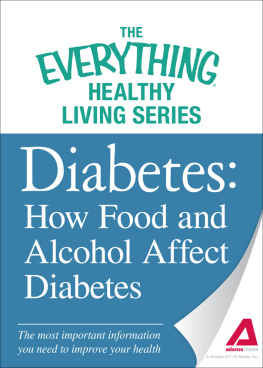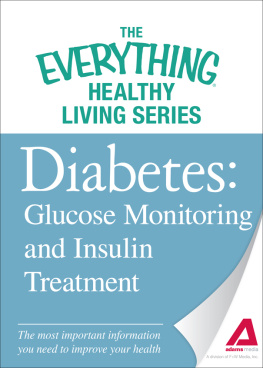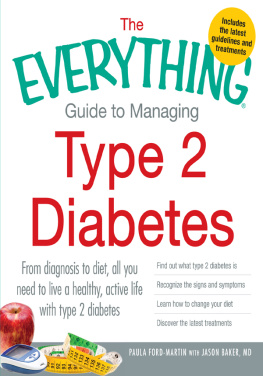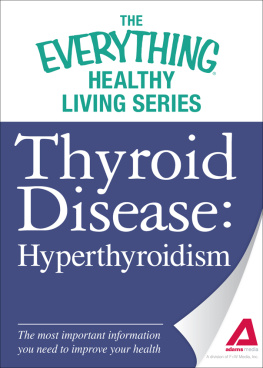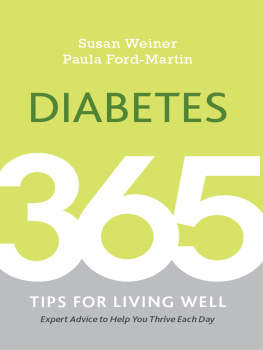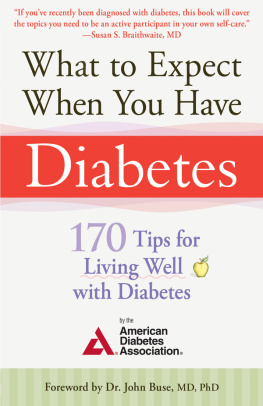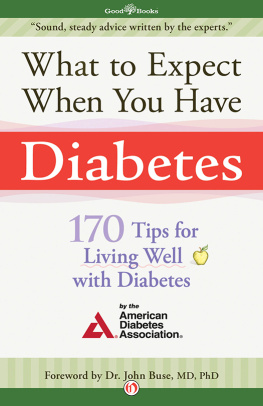Adams Media, a division of F+W Media, Inc.
For more than 10 years, millions of readers have trusted the bestselling Everything series for expert advice and important information on health topics ranging from pregnancy and postpartum care to heart health, anxiety, and diabetes. Packed with the most recent, up-to-date data, Everything health guides help you get the right diagnosis, choose the best doctor, and find the treatment options that work for you.
The Everything Healthy Living Series books are concise guides, focusing on only the essential information you need. Whether youre looking for an overview of traditional and alternative migraine treatments, advice on starting a heart-healthy lifestyle, or suggestions for finding the right medical team, theres an Everything Healthy Living Book for you.
Diabetes
If youve picked up this book, chances are that diabetes has touched your life or the life of someone close to you. Whatever the diagnosis pre-diabetes, type 1, type 2, or gestational diabetes can be a frightening and personally devastating diagnosis. Fortunately, learning all you can about diabetes and seeking support are probably the two most important components to staying on top of this disease.
A key phrase in the lexicon of diabetes care is good control. For those new to diabetes, good control means keeping your blood glucose, or blood sugar, in a range at or close to normal through diet, exercise, and/or medication (which can include pills, insulin, and/or other injectable drugs). Control is the answer to managing diabetes physically as well as emotionally. Always remember that the power is in your hands to determine how diabetes affects your life.
Managing diabetes requires knowledge, dedication, and a certain doggedness of character. Most importantly, it requires a commitment to being a leader, not a follower, in your own health care. Surrounding yourself with good people endocrinologists and diabetologists, certified diabetes educators, registered dietitians, and more is an excellent start. But it takes more than a crack medical team to control diabetes. Playing an active role in your own health care as coach of your health care team is essential for staying both healthy and happy. So is surrounding yourself with people who care about you and are willing to support you in your pursuit of wellness.
High blood glucose levels can affect every system of the body over time if not managed properly. Heart disease, stroke, vision loss, kidney disease, and nerve damage are just a few of the complications that uncontrolled diabetes leaves in its wake. This is why educating yourself about good diabetes management through diet, exercise, medication, lifestyle, and more is so very essential.
Medical breakthroughs like continuous glucose monitoring technologies, new oral and injectable medications and insulin formulations, insulin pumps, and others have drastically improved the quality of life for all people with diabetes, but there is still no cure for the disease. Until there is, staying current on developments in diabetes management, communicating with your health care team, and staying on top of self-care through healthy lifestyle choices are absolutely essential to wellness.
If youd like to learn more about diabetes, check out The Everything Health Guide to Diabetes, 2nd Edition , available in print (978-1-59869-785-8) and eBook (978-1-60550-788-0) formats.
Food and Blood Glucose
Whether you have type 1 or type 2 diabetes, the food you eat is going to have a major impact on your blood glucose levels and therefore on your diabetes control and risk of related complications. In fact, what you eat is so important that the ADA refers to dietary management of diabetes as medical nutrition therapy (MNT).
All about Carbohydrates
Carbohydrates are your bodys primary source of glucose, and glucose is your cellular fuel. The body begins to convert carbohydrates almost entirely into glucose shortly after carb-containing foods are eaten, and insulin helps to unlock the cells to move the glucose from the bloodstream into the cells for energy. If you have insufficient insulin production or your body is resistant to insulin, consuming too many carbohydrates can cause blood glucose to rise unduly.
All foods that contain starches and/or sugars including fruits, vegetables, milk, yogurt, breads, grains, beans, and pasta contain carbs. Virtually the only whole foods that are carbohydrate-free are protein-rich meats, poultry, and finfish (when prepared without additional ingredients such as breading and marinades), and fats such as cooking oils and shortening.
To avoid all carb-containing foods is both impossible and unadvisable your body needs the important micronutrients and phytochemicals contained in these foods. But you do need to learn the basics of assessing the quantity and quality of carbohydrates in your food, how your body reacts to them, and how to make smart carb choices based on this information.
Carb Science
Carbohydrates are categorized by their chemical structure. A monosaccharide, or simple sugar, is composed of a single saccharide (sugar) chain. Glucose, fructose (fruit sugar), and galactose are all simple sugars. Disaccharides are two simple sugars joined together, and include lactose (milk sugar), maltose (malt sugar), and sucrose (table sugar). Polysaccharides, or complex carbohydrates, are ten or more simple sugar chains joined. Glycogen, starches, and fiber are polysaccharides. (A fourth type of carbohydrate, oligosaccharides, is composed of three to ten sugar chains, but most of these are usually formed from the breakdown of polysaccharides.)
Essential
The glycemic index of foods does not necessarily correspond to a specific carbohydrate type some complex carbs may have a higher GI than simple carbs. For people with diabetes, the GI can be an effective tool for avoiding blood sugar spikes.
All carbohydrates are hydrolyzed, or broken down, into monosaccharides before they can be processed by the body. Amylase, a type of enzyme found in the saliva and secreted by the pancreas, helps to break down carbs into glucose during their journey through the small intestine. Once hydrolysis occurs, the resulting glucose is absorbed into the bloodstream. Any excess is converted to glycogen and stored in the liver, along with fructose and galactose.
The Glycemic Index
Does it matter what kind of carbs you consume? At one time, nutritionists believed that people with diabetes should avoid simple sugars (monosaccharides and disaccharides) and eat foods containing complex carbohydrates instead, with the mistaken belief that simple sugars would raise glucose levels faster and more dramatically across the board. But its now known that gram for gram, complex carbohydrates found in breads, cereals, potatoes, vegetables, and other foods raise the blood sugar approximately the same amount as do simple sugars like honey, fructose, or table sugar.
However, there may be a difference in how rapidly certain foods raise blood sugar levels. The glycemic index, or GI, is a measure of how quickly the carbs in certain foods are transformed into blood glucose. Foods with a low GI (e.g., beans, multigrain bread) raise glucose levels at a slower and steadier rate than a high-GI food (e.g., rice, potatoes).

